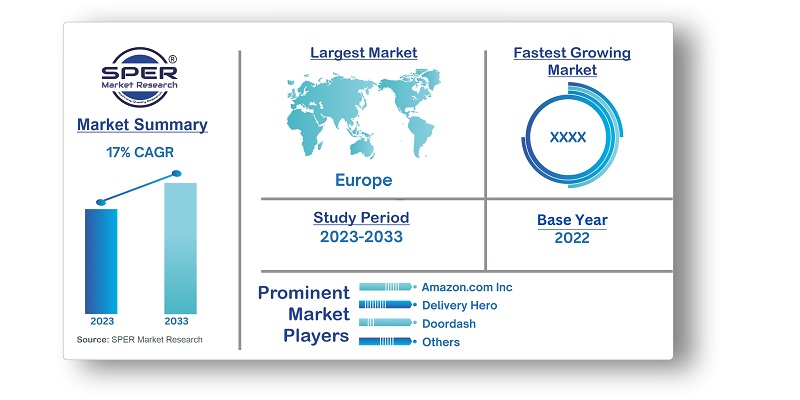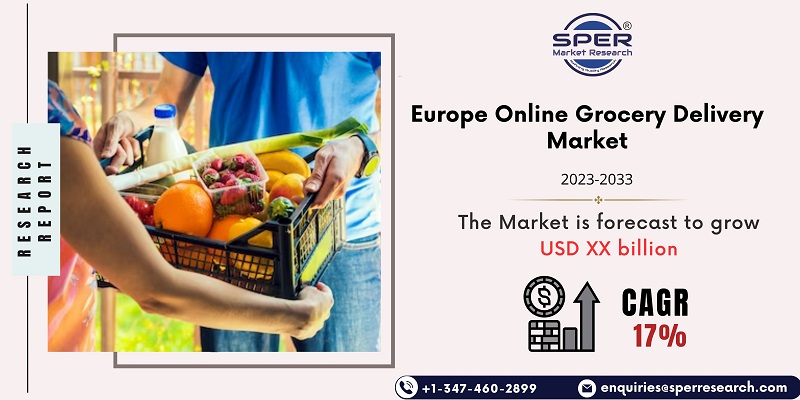
Europe Online Grocery Delivery Market Growth, Size, Trends, Revenue, Share and Future Outlook
Europe Online Grocery Delivery Market Size- By Delivery Type, By Product Type, By Platform, By End User- Regional Outlook, Competitive Strategies and Segment Forecast to 2033
| Published: Dec-2023 | Report ID: FMCG23146 | Pages: 1 - 157 | Formats*: |
| Category : Consumer & Retail | |||
- January 2023: The largest grocery store chain in the UK, Sainsbury's, has teamed up with Eat Takeaway, an online meal ordering and delivery service, to offer faster home delivery for groceries around the nation. Using the Just Eat app, customers can place orders from Sainsbury's for delivery in less than thirty minutes. By the end of February, the collaboration will have expanded to over 175 outlets, with a national deployment scheduled for 2023.
- February 2022: The largest grocery store chain in the UK, Sainsbury's, has teamed up with Eat Takeaway, an online meal ordering and delivery service, to offer faster home delivery for groceries around the nation. Using the Just Eat app, customers can place orders from Sainsbury's for delivery in less than thirty minutes. By the end of February, the collaboration will have expanded to over 175 outlets, with a national deployment scheduled for 2023.


| Report Metric | Details |
| Market size available for years | 2019-2033 |
| Base year considered | 2022 |
| Forecast period | 2023-2033 |
| Segments covered | By Delivery Type, By Product Type, By Platform, By End User |
| Regions covered | United Kingdom, Germany, France, Spain, Eastern Europe and rest of Europe |
| Companies Covered | Amazon.com Inc., Delivery Hero, Doordash, Flink, Getir, Gorillas, Just Eat, Rewe, Uber Eats, Zomato, Others |
- Business/Institutional Customers
- Busy Professionals
- Early Adopters of Technology
- Elderly or Disabled Individuals
- Families with Young Children
- Urban Dwellers
- Working Couples
- Others
| By Delivery Type: |
|
| By Product Type: |
|
| By Platform: |
|
| By End User: |
|
- Europe Online Grocery Delivery Market Size (FY’2023-FY’2033)
- Overview of Europe Online Grocery Delivery Market
- Segmentation of Europe Online Grocery Delivery Market By Delivery Type (Meal Kit Delivery, Quick Commerce, Retail Delivery)
- Segmentation of Europe Online Grocery Delivery Market By Product Type (Bakery & Snacks, Beverages, Canned & Packaged Foods, Dairy & Eggs, Fresh Produce, Meat & Seafood, Others)
- Segmentation of Europe Online Grocery Delivery Market By Platform (Websites, Mobile Apps)
- Segmentation of Europe Online Grocery Delivery Market By End User (Business/Institutional Customers, Individual Consumers)
- Statistical Snap of Europe Online Grocery Delivery Market
- Expansion Analysis of Europe Online Grocery Delivery Market
- Problems and Obstacles in Europe Online Grocery Delivery Market
- Competitive Landscape in the Europe Online Grocery Delivery Market
- Impact of COVID-19 and Demonetization on Europe Online Grocery Delivery Market
- Details on Current Investment in Europe Online Grocery Delivery Market
- Competitive Analysis of Europe Online Grocery Delivery Market
- Prominent Players in the Europe Online Grocery Delivery Market
- SWOT Analysis of Europe Online Grocery Delivery Market
- Europe Online Grocery Delivery Market Future Outlook and Projections (FY’2023-FY’2033)
- Recommendations from Analyst
1.1. Scope of the report1.2. Market segment analysis
2.1. Research data source2.1.1. Secondary Data2.1.2. Primary Data2.1.3. SPER’s internal database2.1.4. Premium insight from KOL’s2.2. Market size estimation2.2.1. Top-down and Bottom-up approach2.3. Data triangulation
4.1. Driver, Restraint, Opportunity and Challenges analysis4.1.1. Drivers4.1.2. Restraints4.1.3. Opportunities4.1.4. Challenges4.2. COVID-19 Impacts of the Europe Online Grocery Delivery Market
5.1. SWOT Analysis5.1.1. Strengths5.1.2. Weaknesses5.1.3. Opportunities5.1.4. Threats5.2. PESTEL Analysis5.2.1. Political Landscape5.2.2. Economic Landscape5.2.3. Social Landscape5.2.4. Technological Landscape5.2.5. Environmental Landscape5.2.6. Legal Landscape5.3. PORTER’s Five Forces5.3.1. Bargaining power of suppliers5.3.2. Bargaining power of buyers5.3.3. Threat of Substitute5.3.4. Threat of new entrant5.3.5. Competitive rivalry5.4. Heat Map Analysis
6.1. Europe Online Grocery Delivery Market Manufacturing Base Distribution, Sales Area, Product Type6.2. Mergers & Acquisitions, Partnerships, Product Launch, and Collaboration in Europe Online Grocery Delivery Market
7.1. Europe Online Grocery Delivery Market Value Share and Forecast, By Delivery Type, 2023-20337.2. Meal Kit Delivery7.3. Quick Commerce7.4. Retail Delivery
8.1. Europe Online Grocery Delivery Market Value Share and Forecast, By Product Type, 2023-20338.2. Bakery & Snacks8.3. Beverages8.4. Canned & Packaged Foods8.5. Dairy & Eggs8.6. Fresh Produce8.7. Meat & Seafood8.8. Others
9.1. Europe Online Grocery Delivery Market Value Share and Forecast, By Platform, 2023-20339.2. Websites9.3. Mobile Apps
10.1. Europe Online Grocery Delivery Market Value Share and Forecast, By End User, 2023-203310.2. Business/Institutional Customers10.3. Individual Consumers
11.1. Europe Online Grocery Delivery Market Size and Market Share
12.1. Europe Online Grocery Delivery Market Size and Market Share By Delivery Type (2019-2026)12.2. Europe Online Grocery Delivery Market Size and Market Share By Delivery Type (2027-2033)
13.1. Europe Online Grocery Delivery Market Size and Market Share By Product Type (2019-2026)13.2. Europe Online Grocery Delivery Market Size and Market Share By Product Type (2027-2033)
14.1. Europe Online Grocery Delivery Market Size and Market Share By Platform (2019-2026)14.2. Europe Online Grocery Delivery Market Size and Market Share By Platform (2027-2033)
15.1. Europe Online Grocery Delivery Market Size and Market Share By End User (2019-2026)15.2. Europe Online Grocery Delivery Market Size and Market Share By End User (2027-2033)
16.1. Europe Online Grocery Delivery Market Size and Market Share By Region (2019-2026)16.2. Europe Online Grocery Delivery Market Size and Market Share By Region (2027-2033)16.3. United Kingdom16.4. Germany16.5. France16.6. Spain16.7. Eastern Europe16.8. Rest of Europe
17.1. Amazon.com Inc.17.1.1. Company details17.1.2. Financial outlook17.1.3. Product summary17.1.4. Recent developments17.2. Delivery Hero17.2.1. Company details17.2.2. Financial outlook17.2.3. Product summary17.2.4. Recent developments17.3. Doordash17.3.1. Company details17.3.2. Financial outlook17.3.3. Product summary17.3.4. Recent developments17.4. Flink17.4.1. Company details17.4.2. Financial outlook17.4.3. Product summary17.4.4. Recent developments17.5. Getir17.5.1. Company details17.5.2. Financial outlook17.5.3. Product summary17.5.4. Recent developments17.6. Gorillas17.6.1. Company details17.6.2. Financial outlook17.6.3. Product summary17.6.4. Recent developments17.7. Just Eat17.7.1. Company details17.7.2. Financial outlook17.7.3. Product summary17.7.4. Recent developments17.8. Rewe17.8.1. Company details17.8.2. Financial outlook17.8.3. Product summary17.8.4. Recent developments17.9. Uber Eats17.9.1. Company details17.9.2. Financial outlook17.9.3. Product summary17.9.4. Recent developments17.10. Zomato17.10.1. Company details17.10.2. Financial outlook17.10.3. Product summary17.10.4. Recent developments17.11. Others
SPER Market Research’s methodology uses great emphasis on primary research to ensure that the market intelligence insights are up to date, reliable and accurate. Primary interviews are done with players involved in each phase of a supply chain to analyze the market forecasting. The secondary research method is used to help you fully understand how the future markets and the spending patterns look likes.
The report is based on in-depth qualitative and quantitative analysis of the Product Market. The quantitative analysis involves the application of various projection and sampling techniques. The qualitative analysis involves primary interviews, surveys, and vendor briefings. The data gathered as a result of these processes are validated through experts opinion. Our research methodology entails an ideal mixture of primary and secondary initiatives.



Frequently Asked Questions About This Report
PLACE AN ORDER
Year End Discount
Sample Report
Pre-Purchase Inquiry
NEED CUSTOMIZATION?
Request CustomizationCALL OR EMAIL US
100% Secure Payment






Related Reports
Our Global Clients
Our data-driven insights have influenced the strategy of 200+ reputed companies across the globe.




















